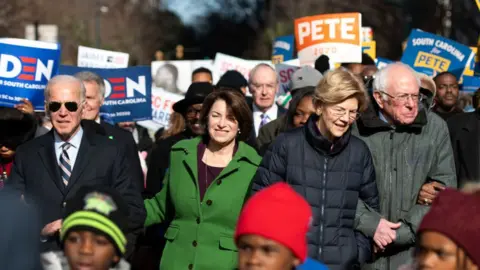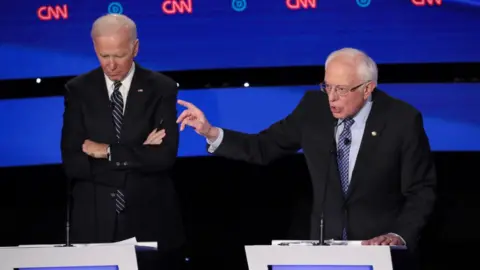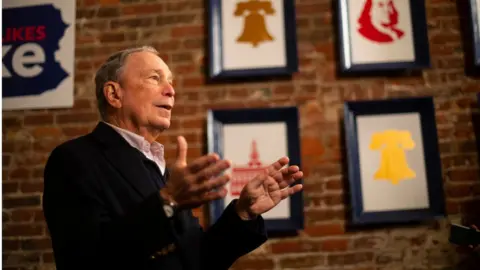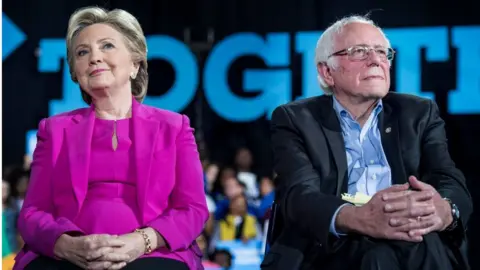US election 2020: Democratic candidates on attack - against each other

 Getty Images
Getty ImagesUntil recently, the biggest disputes among the candidates have been policy-related. But now, the attacks are getting personal.
Even a casual observer of the string of Democratic debates in 2019 could probably recite some of the back-and-forth over a government-run medical insurance programme versus some sort of public-private hybrid.
Calm. Respectful. Dare we say, boring.
Not any more.
Here's a quick rundown of some of the testiest exchanges of recent days.
Sanders vs Biden
As the Iowa caucuses approach, the liberal/moderate divide within the Democratic Party - which has played itself out time and time again during the debates - appears to be crystallising around two candidates in particular, Bernie Sanders and Joe Biden.
And it's getting personal.
This past weekend, the Sanders camp directly targeted Biden's past support for reform of the government-funded retirement programme Social Security, circulating an out-of-context clip that made it appear Biden had endorsed a Republican plan to cut benefits.
Biden responded by saying the video was "fake" and calling on Sanders to apologise. That prompted the Sanders campaign to release a slew of other, more legitimate video clips where Biden endorsed Social Security reform, including reducing benefit increases.
 Getty Images
Getty ImagesSanders himself called Biden a "decent person", but said their records on defending the programme were very different.
On Tuesday evening, the two campaigns traded another round of videos on Biden's record, followed by a not-so-subtle Biden jab on Wednesday morning on Sanders' record on the Brady Bill, a Democrat-backed gun-control measure that passed in the 1990s and has since expired.


"It'd be like me going back and pointing out that Bernie voted against the Brady Bill five times," Biden said. "I mean, he's made up for that."
This fight is far from over - and although the tussle over Social Security could be of great interest for elderly Democratic voters, it's not the only line of attack from the Sanders team.
His surrogates penned opinion columns directly attacking other parts of Biden's record. Nina Turner, a top Sanders adviser, wrote in a South Carolina paper that Biden "has repeatedly betrayed black voters", citing the then-senator's support for welfare reform and a draconian crime bill, among other reasons.
Another Sanders supporter, New York law professor Zephyr Teachout, wrote in The Guardian that Biden had a "big corruption problem" because of his willingness to take donations from corporations and the wealthy.
That last one prompted a rare apology from Sanders.
"It is absolutely not my view that Joe is corrupt in any way," he told CBS News on Monday. "And I'm sorry that that op-ed appeared."
Sanders may be backing off here, but the fact that the clashes between the two candidates are on Biden's record probably plays to the Vermont senator's advantage - and are a strategy he will not be quick to abandon.
The big question at this point is whether Biden decides it's time his side stops playing defence and goes on the attack.
Warren vs Sanders
If the Biden fight is clearly one of Sanders' choosing, that may not have been the case with last week's clash between Sanders and fellow liberal Elizabeth Warren - which appeared to put the unstated non-aggression pact between the two progressive stars at risk.
Warren bristled at a Sanders canvassing script that instructed volunteers to tell Warren supporters that their candidate had limited appeal. Sanders' team accused Warren's side of being behind a report that Sanders had told his fellow senator back in 2018 that a woman candidate couldn't beat Trump in 2020.
After an icy post-debate exchange between the two, where both candidates suggested the other was lying, some Sanders supporters took to social media to accuse Warren of being a treacherous snake.
Warren has since refused to comment on the matter, saying only that she and Sanders are friends. The Vermont senator, for his part, tried to explain his way out of things on Sunday.
"I think everybody has their own sets of problems," he told a New Hampshire public radio interviewer. "I'm 78 years of age. That's a problem ... If you're looking at Buttigieg, he's a young guy, people will say, 'Well, he's too young to be president. You look at this one, she's a woman.' So everybody, you know, brings some negatives."

Sanders' campaign issued a quick clarification, that Sanders was talking about the challenges of ageism, sexism and homophobia, but equating perceptions of being too young or too old as a presidential candidate with being a woman may not end up playing out the way he hopes.

Warren v Bloomberg
A funny thing has been happening while the Democratic race bounces along with much of the national media focus on first-in-the-nation Iowa. Former New York Mayor and multi-billionaire Mike Bloomberg has been steadily rising in national polls.
 Getty Images
Getty ImagesTwo recent surveys put him at 9%, while another has him at 10% - effectively tying with once-surging former Indiana mayor Pete Buttigieg for fourth place in the RealClearPolitics national poll tracker.
Bloomberg's success has come with a steep price tag - he has already spent more than $200m on television advertising - and attracted the attention of one of his rivals, Warren.
On Sunday the Massachusetts progressive criticised Bloomberg's repeated delays in filing necessary financial disclosure reports with the Federal Election Commission.

More analysis from Anthony:

"If he has entanglements with China, serious conflicts of interest, business interests in other parts of the world or with other corporations, when do we get to know about that?" she asked. "That is not how democracy is supposed to work, and we need to shut that down."
Warren also suggested Bloomberg may be running for president because it's less expensive than paying her proposed wealth tax.
Bloomberg has launched his own barbs. Last week he said that Warren - and Sanders - "didn't know what they're talking about" when they called for breaking up big tech firms.
Given Warren's populist liberal campaign message, Bloomberg makes a perfect foil. Her attention may benefit Bloomberg, as well, allowing him to better position himself as the moderate alternative to the party's activist liberals.
Clinton v Sanders
While the 2020 campaign heats up, this week offered a reminder that maybe the 2016 primary race never really ended - at least for some.
In a documentary about her life set to release on 6 March, Hillary Clinton, the last Democratic presidential nominee, reveals what she really thinks about Sanders, whom she defeated in a primary process that was closer than expected.
"He was in Congress for years," she says. "He had one senator support him. Nobody likes him, nobody wants to work with him, he got nothing done. He was a career politician. It's all just baloney, and I feel so bad that people got sucked into it."
 Getty Images
Getty ImagesIn an interview with Hollywood Reporter, she leaned into those views, expanding her criticism to those around Sanders.
"It's his leadership team," she said. "It's his prominent supporters. It's his online Bernie Bros and their relentless attacks on lots of his competitors, particularly the women. And I really hope people are paying attention to that because it should be worrisome that he has permitted this culture - not only permitted, [he] seems to really be very much supporting it."
Sanders, for his part, has shrugged off the criticism, quipping that "on a good day, my wife likes me", before saying that Clinton was "entitled to her point of view".

And in a tweet later on Tuesday, Clinton appeared to back away a bit, particularly from an earlier statement that she wouldn't commit to supporting Sanders if he won the Democratic nomination.
"I thought everyone wanted my authentic, unvarnished views!" she wrote. "But to be serious, the number one priority for our country and world is retiring Trump, and, as I always have, I will do whatever I can to support our nominee."

Now that this is settled, the Democrats can get back to being one big happy family. Or not.
By historical standards, the 2020 race for the Democratic presidential nomination has been remarkably tame. In the final weeks before the Iowa caucuses kick off the multi-month selection process, however, things are starting to get chippy.

Who will take on Trump in 2020?

